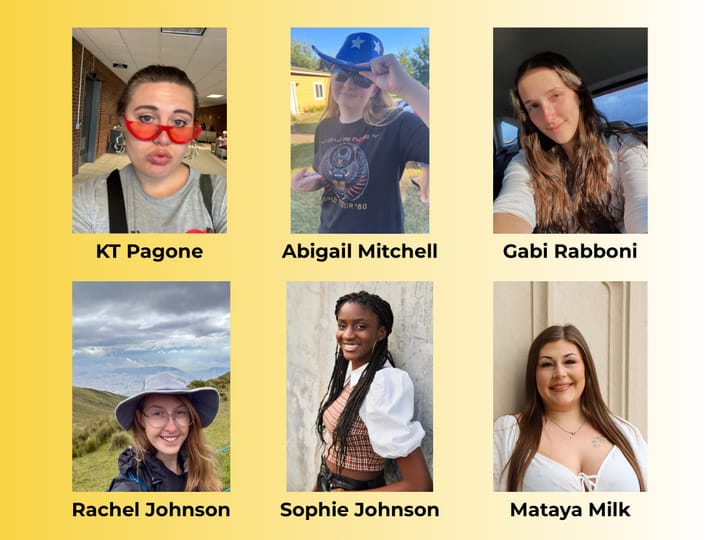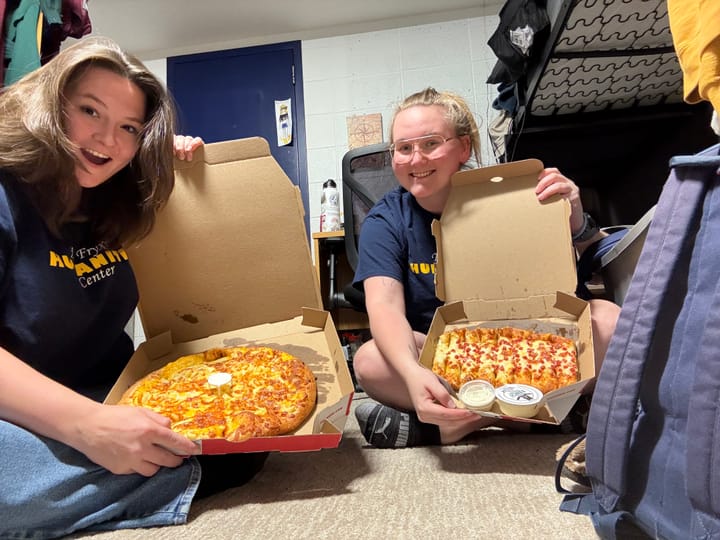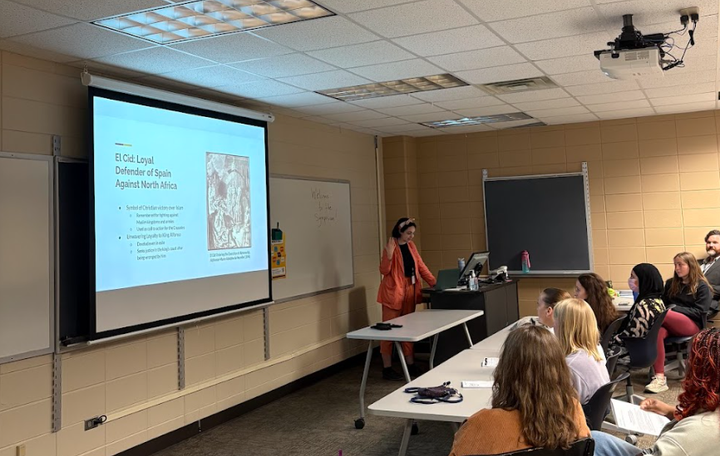Trading the stage for stitches: costume shop uses materials to sew masks for AU staffers, community members
The roaring hum of sewing machines fills the costume shop where masks of brown, maroon and floral are being carefully crafted. Sitting at a worktable in the center of the room, Cindy Bakke and two students sit snipping fabric, winding bobbins and threading their machines.
One folds pleats into the soft cotton. Another fastens a button to the band. High windows make the room bright with afternoon sun as chatter takes over the rhythm of sewing.
Bakke, costume shop supervisor in the Augustana Theater Department, and four Augustana students have been sewing face masks to distribute to Augustana staff and Sioux Falls families amid the coronavirus pandemic. So far, they have crafted more than 80.
“We might save a life,” Bakke said. “We might save someone from having to go to the hospital.”
Students Kale Hellman, Kirtana Krishna Kumar, Chloe Bartels and Tatiana Chance fulfill their work study hours by making face masks in the costume department.
Bakke said the group hopes to make the Sioux Falls community feel safe and help flatten the curve of coronavirus cases.
The rectangular masks are crafted from two pleated sheets of cotton fabric with a twist-tie nosepiece and interfacing, which is a fabric that stabilizes the mask. Since elastic is scarce, the group creates the straps from bias tape and buttons.
Augustana’s theater department isn’t the only troupe casting colorful racks of costumes aside and transitioning their sewing skills from the stage to the everyday.
Costume makers from Broadway to Hollywood are also transitioning from sewing stage garments to protective face masks, according to amNewYork and the Los Angeles Times.
“We are all putting our sewing skills, our access to fabric and our ingenuity into doing everything we can to help,” Bakke said.
Always looking to improve, Bakke said she has been asking for feedback from people working in hospitals and using online tips.
The group continues to seek button and elastic donations, and people have already begun donating supplies to allow the group to keep on sewing.
Since the beginning of the project, 72 masks have already been delivered to on-campus staff.
“We wanted to be sure our smaller community was taken care of, especially people who are working for our benefit, like [the] housekeeping staff,” Bakke said.
The group also offers masks to families who may need them, including those of Smithfield workers. As of Wednesday, the group had crafted 84 masks total.
But that number rises daily.
“I am able to contribute in some way to [preventing the spread of] this entire pandemic,” Krishna Kumar, senior biology and philosophy major, said. “I can talk to my friends and say, ‘Do you need any help? Do you need a mask that I can make?’”
Bakke said the group also hopes to begin making Olsen masks soon, which are acceptable to donate to hospitals. However, Olsen masks require more materials and time.
“Right now, it’s definitely a sense of security for the people that we’ve been able to give masks to,” Hellman, a junior English and theater major, said.
The four students join Bakke on weekday afternoons during Bakke’s normal shift. Sitting at different corners of the table, they sometimes work up to four hours a day. Sewing one mask takes anywhere from 40 minutes to an hour, according to Hellman.
Bakke’s role at Augustana is to teach people to sew, so this project fits right into her groove as she teaches students the pattern and technique for the masks.
“No matter how many times you make a mistake or ask her a question, she’s so patient about it, Krishna Kumar said. “And with a bright smile, she tells you what needs to be done.”
As seams and pleats become second nature, the group chats about family or the day’s events.
“Not only are we doing something tangible,” Bakke said, “but we are able to talk and share and vent and reassure one another, and that’s been really incredible.”
Hellman said the routine of creating masks each day helped them “break up” their days between homework and time in their apartment.
“Even when classes were regular, going to the costume shop was part of my everyday because it is my work study position,” Hellman said. “So in that regard, I still get to maintain a little bit of normalcy.”
The time together also allows Bakke and the students to socialize, despite the gathering restrictions, according to Bakke.
“I like getting to spend time — at a good social distance — with other people,” Krishna Kumar said.
As they form new relationships with each other, the fabric still flies under the needle transforming mere fabric into a protective shield.
“I’m most fond of the fact that the efforts that we’ve been taking have been able to actually help people during this time of need,” Hellman said.



